Project Management Fundamentals Assignment 1 Analysis Report
VerifiedAdded on 2023/04/23
|7
|3330
|427
Homework Assignment
AI Summary
This assignment solution delves into the core concepts of project management, beginning with a comparison of various methodologies, specifically PMBOK and PRINCE2, highlighting their strengths, weaknesses, and potential for integration. It then explores the role and benefits of integration management as defined by PMBOK, emphasizing its importance in project control, resource allocation, and budget management. Furthermore, the solution analyzes project scope management and its relationship with integration, and provides an in-depth overview of time and cost management techniques, including activity definition, sequencing, resource estimation, and schedule development. The assignment underscores the significance of effective time management, emphasizing its impact on project success and the importance of accurate resource allocation and scheduling.
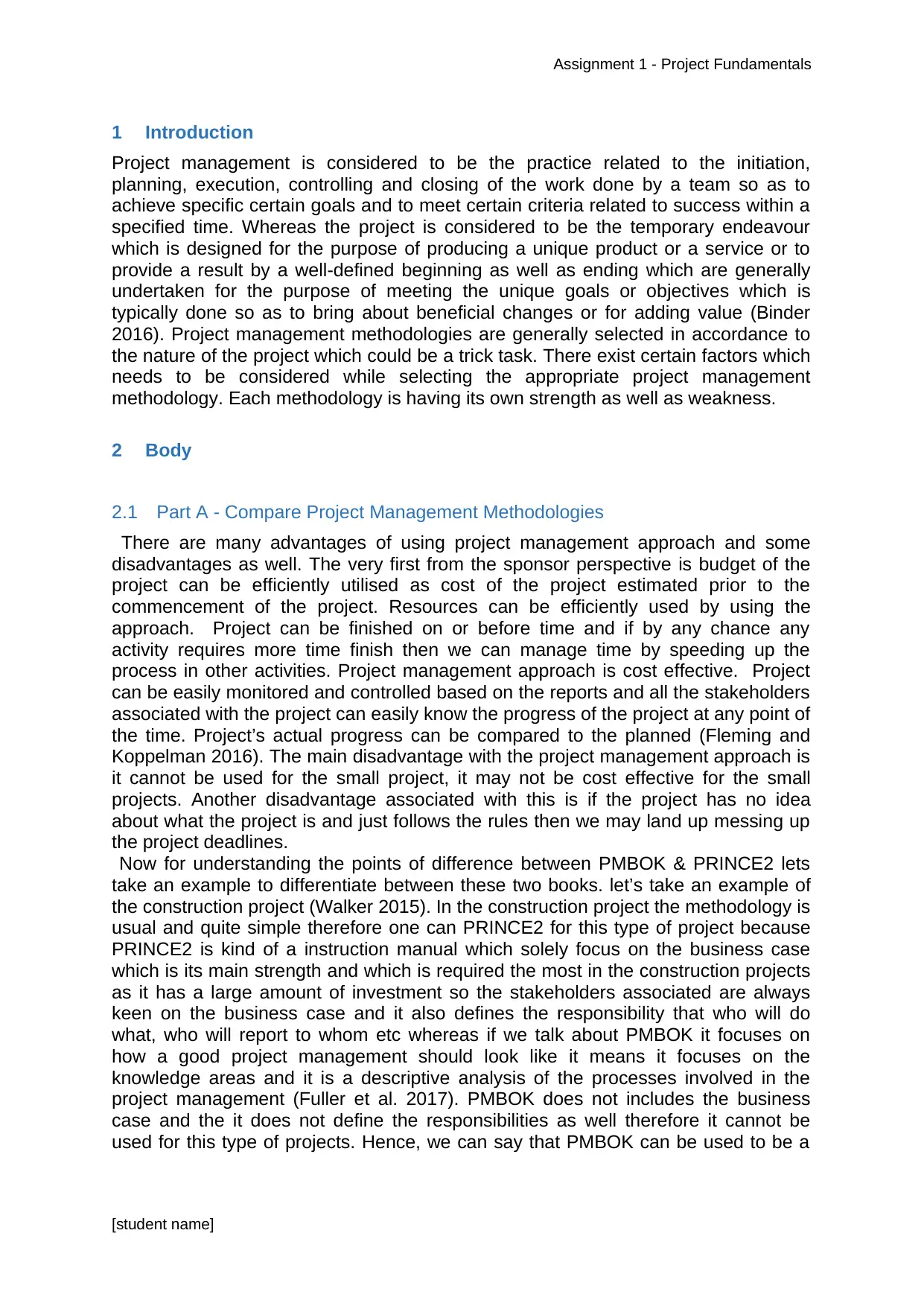
Assignment 1 - Project Fundamentals
1 Introduction
Project management is considered to be the practice related to the initiation,
planning, execution, controlling and closing of the work done by a team so as to
achieve specific certain goals and to meet certain criteria related to success within a
specified time. Whereas the project is considered to be the temporary endeavour
which is designed for the purpose of producing a unique product or a service or to
provide a result by a well-defined beginning as well as ending which are generally
undertaken for the purpose of meeting the unique goals or objectives which is
typically done so as to bring about beneficial changes or for adding value (Binder
2016). Project management methodologies are generally selected in accordance to
the nature of the project which could be a trick task. There exist certain factors which
needs to be considered while selecting the appropriate project management
methodology. Each methodology is having its own strength as well as weakness.
2 Body
2.1 Part A - Compare Project Management Methodologies
There are many advantages of using project management approach and some
disadvantages as well. The very first from the sponsor perspective is budget of the
project can be efficiently utilised as cost of the project estimated prior to the
commencement of the project. Resources can be efficiently used by using the
approach. Project can be finished on or before time and if by any chance any
activity requires more time finish then we can manage time by speeding up the
process in other activities. Project management approach is cost effective. Project
can be easily monitored and controlled based on the reports and all the stakeholders
associated with the project can easily know the progress of the project at any point of
the time. Project’s actual progress can be compared to the planned (Fleming and
Koppelman 2016). The main disadvantage with the project management approach is
it cannot be used for the small project, it may not be cost effective for the small
projects. Another disadvantage associated with this is if the project has no idea
about what the project is and just follows the rules then we may land up messing up
the project deadlines.
Now for understanding the points of difference between PMBOK & PRINCE2 lets
take an example to differentiate between these two books. let’s take an example of
the construction project (Walker 2015). In the construction project the methodology is
usual and quite simple therefore one can PRINCE2 for this type of project because
PRINCE2 is kind of a instruction manual which solely focus on the business case
which is its main strength and which is required the most in the construction projects
as it has a large amount of investment so the stakeholders associated are always
keen on the business case and it also defines the responsibility that who will do
what, who will report to whom etc whereas if we talk about PMBOK it focuses on
how a good project management should look like it means it focuses on the
knowledge areas and it is a descriptive analysis of the processes involved in the
project management (Fuller et al. 2017). PMBOK does not includes the business
case and the it does not define the responsibilities as well therefore it cannot be
used for this type of projects. Hence, we can say that PMBOK can be used to be a
[student name]
1 Introduction
Project management is considered to be the practice related to the initiation,
planning, execution, controlling and closing of the work done by a team so as to
achieve specific certain goals and to meet certain criteria related to success within a
specified time. Whereas the project is considered to be the temporary endeavour
which is designed for the purpose of producing a unique product or a service or to
provide a result by a well-defined beginning as well as ending which are generally
undertaken for the purpose of meeting the unique goals or objectives which is
typically done so as to bring about beneficial changes or for adding value (Binder
2016). Project management methodologies are generally selected in accordance to
the nature of the project which could be a trick task. There exist certain factors which
needs to be considered while selecting the appropriate project management
methodology. Each methodology is having its own strength as well as weakness.
2 Body
2.1 Part A - Compare Project Management Methodologies
There are many advantages of using project management approach and some
disadvantages as well. The very first from the sponsor perspective is budget of the
project can be efficiently utilised as cost of the project estimated prior to the
commencement of the project. Resources can be efficiently used by using the
approach. Project can be finished on or before time and if by any chance any
activity requires more time finish then we can manage time by speeding up the
process in other activities. Project management approach is cost effective. Project
can be easily monitored and controlled based on the reports and all the stakeholders
associated with the project can easily know the progress of the project at any point of
the time. Project’s actual progress can be compared to the planned (Fleming and
Koppelman 2016). The main disadvantage with the project management approach is
it cannot be used for the small project, it may not be cost effective for the small
projects. Another disadvantage associated with this is if the project has no idea
about what the project is and just follows the rules then we may land up messing up
the project deadlines.
Now for understanding the points of difference between PMBOK & PRINCE2 lets
take an example to differentiate between these two books. let’s take an example of
the construction project (Walker 2015). In the construction project the methodology is
usual and quite simple therefore one can PRINCE2 for this type of project because
PRINCE2 is kind of a instruction manual which solely focus on the business case
which is its main strength and which is required the most in the construction projects
as it has a large amount of investment so the stakeholders associated are always
keen on the business case and it also defines the responsibility that who will do
what, who will report to whom etc whereas if we talk about PMBOK it focuses on
how a good project management should look like it means it focuses on the
knowledge areas and it is a descriptive analysis of the processes involved in the
project management (Fuller et al. 2017). PMBOK does not includes the business
case and the it does not define the responsibilities as well therefore it cannot be
used for this type of projects. Hence, we can say that PMBOK can be used to be a
[student name]
Paraphrase This Document
Need a fresh take? Get an instant paraphrase of this document with our AI Paraphraser
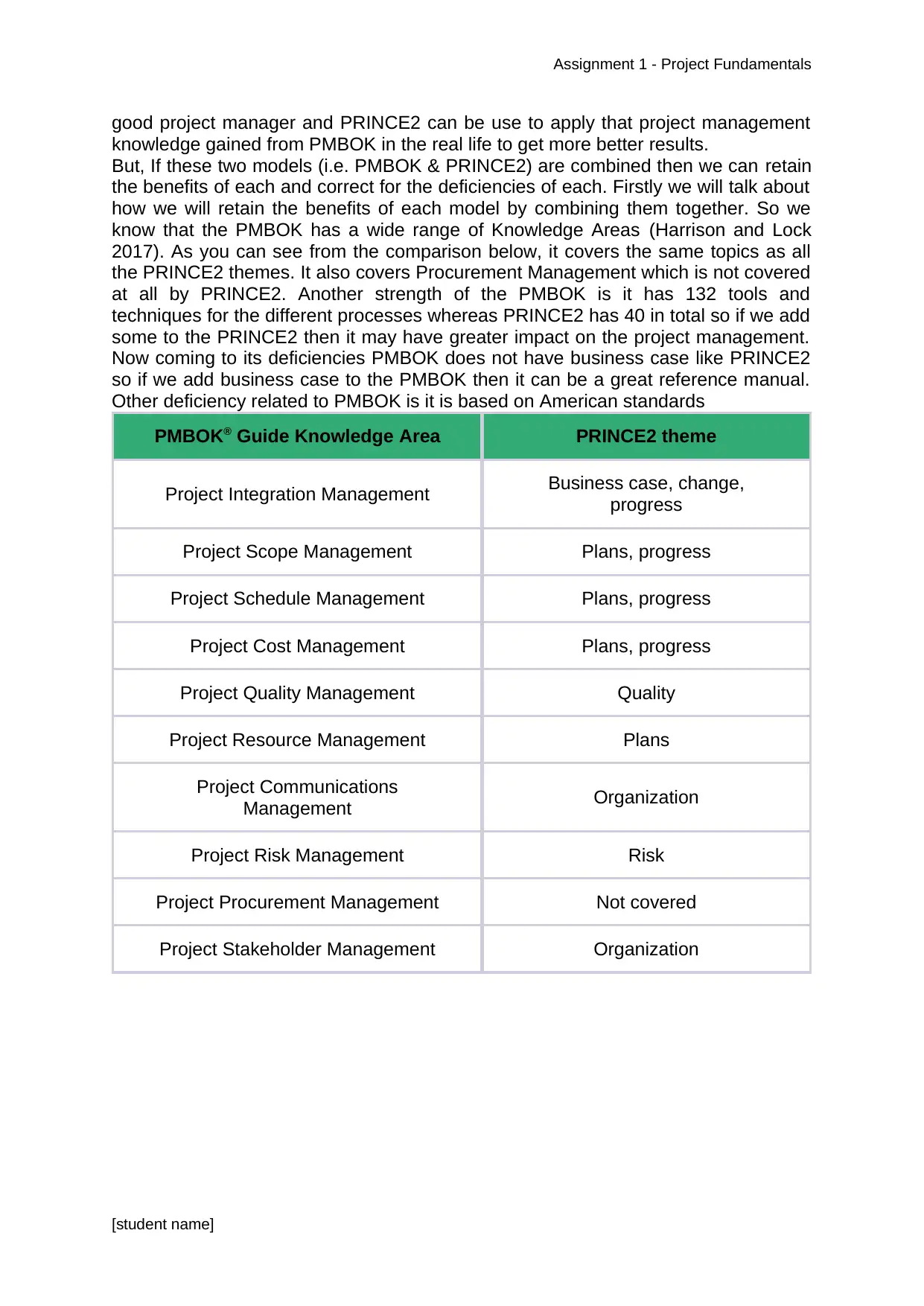
Assignment 1 - Project Fundamentals
good project manager and PRINCE2 can be use to apply that project management
knowledge gained from PMBOK in the real life to get more better results.
But, If these two models (i.e. PMBOK & PRINCE2) are combined then we can retain
the benefits of each and correct for the deficiencies of each. Firstly we will talk about
how we will retain the benefits of each model by combining them together. So we
know that the PMBOK has a wide range of Knowledge Areas (Harrison and Lock
2017). As you can see from the comparison below, it covers the same topics as all
the PRINCE2 themes. It also covers Procurement Management which is not covered
at all by PRINCE2. Another strength of the PMBOK is it has 132 tools and
techniques for the different processes whereas PRINCE2 has 40 in total so if we add
some to the PRINCE2 then it may have greater impact on the project management.
Now coming to its deficiencies PMBOK does not have business case like PRINCE2
so if we add business case to the PMBOK then it can be a great reference manual.
Other deficiency related to PMBOK is it is based on American standards
PMBOK® Guide Knowledge Area PRINCE2 theme
Project Integration Management Business case, change,
progress
Project Scope Management Plans, progress
Project Schedule Management Plans, progress
Project Cost Management Plans, progress
Project Quality Management Quality
Project Resource Management Plans
Project Communications
Management Organization
Project Risk Management Risk
Project Procurement Management Not covered
Project Stakeholder Management Organization
[student name]
good project manager and PRINCE2 can be use to apply that project management
knowledge gained from PMBOK in the real life to get more better results.
But, If these two models (i.e. PMBOK & PRINCE2) are combined then we can retain
the benefits of each and correct for the deficiencies of each. Firstly we will talk about
how we will retain the benefits of each model by combining them together. So we
know that the PMBOK has a wide range of Knowledge Areas (Harrison and Lock
2017). As you can see from the comparison below, it covers the same topics as all
the PRINCE2 themes. It also covers Procurement Management which is not covered
at all by PRINCE2. Another strength of the PMBOK is it has 132 tools and
techniques for the different processes whereas PRINCE2 has 40 in total so if we add
some to the PRINCE2 then it may have greater impact on the project management.
Now coming to its deficiencies PMBOK does not have business case like PRINCE2
so if we add business case to the PMBOK then it can be a great reference manual.
Other deficiency related to PMBOK is it is based on American standards
PMBOK® Guide Knowledge Area PRINCE2 theme
Project Integration Management Business case, change,
progress
Project Scope Management Plans, progress
Project Schedule Management Plans, progress
Project Cost Management Plans, progress
Project Quality Management Quality
Project Resource Management Plans
Project Communications
Management Organization
Project Risk Management Risk
Project Procurement Management Not covered
Project Stakeholder Management Organization
[student name]
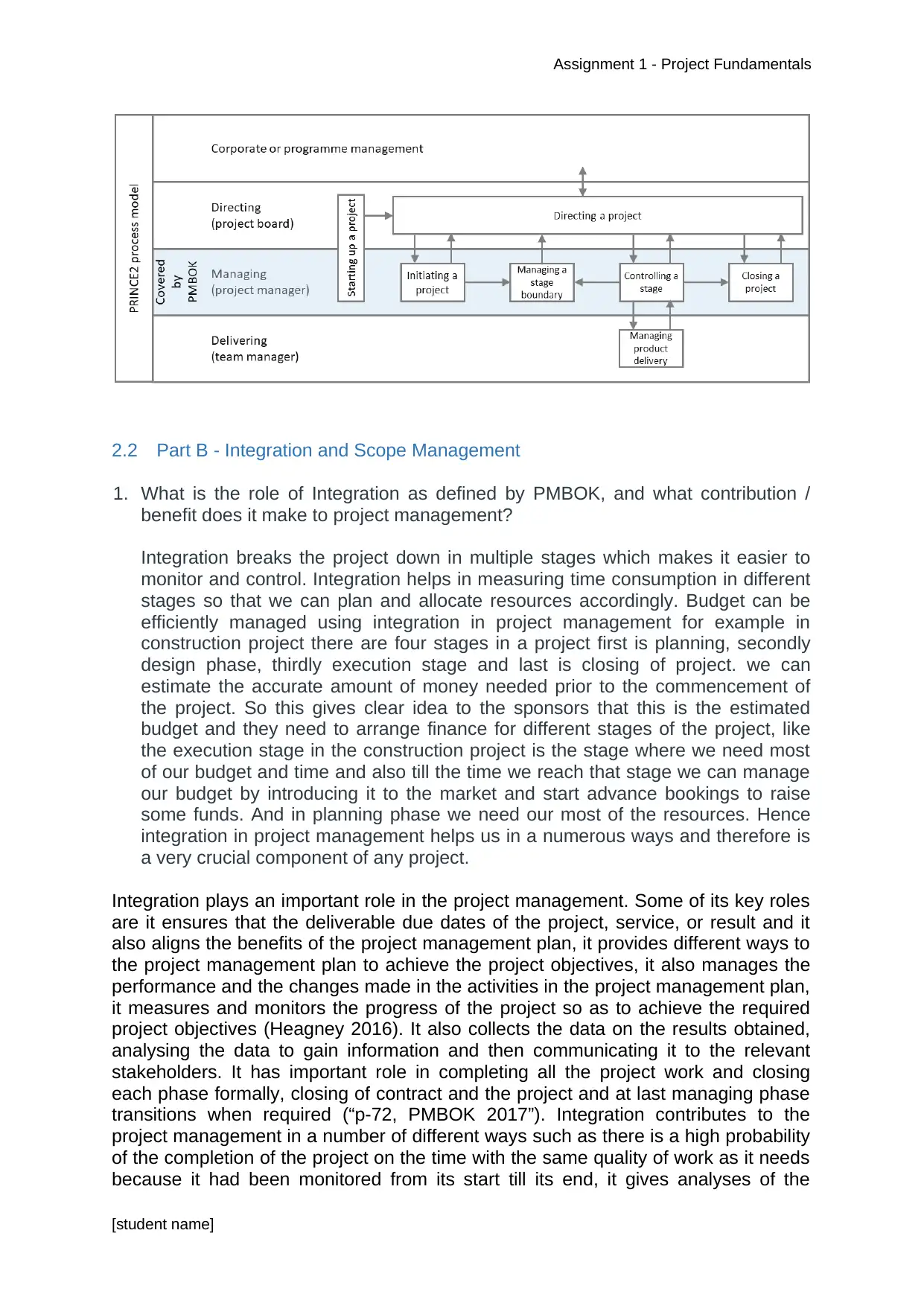
Assignment 1 - Project Fundamentals
2.2 Part B - Integration and Scope Management
1. What is the role of Integration as defined by PMBOK, and what contribution /
benefit does it make to project management?
Integration breaks the project down in multiple stages which makes it easier to
monitor and control. Integration helps in measuring time consumption in different
stages so that we can plan and allocate resources accordingly. Budget can be
efficiently managed using integration in project management for example in
construction project there are four stages in a project first is planning, secondly
design phase, thirdly execution stage and last is closing of project. we can
estimate the accurate amount of money needed prior to the commencement of
the project. So this gives clear idea to the sponsors that this is the estimated
budget and they need to arrange finance for different stages of the project, like
the execution stage in the construction project is the stage where we need most
of our budget and time and also till the time we reach that stage we can manage
our budget by introducing it to the market and start advance bookings to raise
some funds. And in planning phase we need our most of the resources. Hence
integration in project management helps us in a numerous ways and therefore is
a very crucial component of any project.
Integration plays an important role in the project management. Some of its key roles
are it ensures that the deliverable due dates of the project, service, or result and it
also aligns the benefits of the project management plan, it provides different ways to
the project management plan to achieve the project objectives, it also manages the
performance and the changes made in the activities in the project management plan,
it measures and monitors the progress of the project so as to achieve the required
project objectives (Heagney 2016). It also collects the data on the results obtained,
analysing the data to gain information and then communicating it to the relevant
stakeholders. It has important role in completing all the project work and closing
each phase formally, closing of contract and the project and at last managing phase
transitions when required (“p-72, PMBOK 2017”). Integration contributes to the
project management in a number of different ways such as there is a high probability
of the completion of the project on the time with the same quality of work as it needs
because it had been monitored from its start till its end, it gives analyses of the
[student name]
2.2 Part B - Integration and Scope Management
1. What is the role of Integration as defined by PMBOK, and what contribution /
benefit does it make to project management?
Integration breaks the project down in multiple stages which makes it easier to
monitor and control. Integration helps in measuring time consumption in different
stages so that we can plan and allocate resources accordingly. Budget can be
efficiently managed using integration in project management for example in
construction project there are four stages in a project first is planning, secondly
design phase, thirdly execution stage and last is closing of project. we can
estimate the accurate amount of money needed prior to the commencement of
the project. So this gives clear idea to the sponsors that this is the estimated
budget and they need to arrange finance for different stages of the project, like
the execution stage in the construction project is the stage where we need most
of our budget and time and also till the time we reach that stage we can manage
our budget by introducing it to the market and start advance bookings to raise
some funds. And in planning phase we need our most of the resources. Hence
integration in project management helps us in a numerous ways and therefore is
a very crucial component of any project.
Integration plays an important role in the project management. Some of its key roles
are it ensures that the deliverable due dates of the project, service, or result and it
also aligns the benefits of the project management plan, it provides different ways to
the project management plan to achieve the project objectives, it also manages the
performance and the changes made in the activities in the project management plan,
it measures and monitors the progress of the project so as to achieve the required
project objectives (Heagney 2016). It also collects the data on the results obtained,
analysing the data to gain information and then communicating it to the relevant
stakeholders. It has important role in completing all the project work and closing
each phase formally, closing of contract and the project and at last managing phase
transitions when required (“p-72, PMBOK 2017”). Integration contributes to the
project management in a number of different ways such as there is a high probability
of the completion of the project on the time with the same quality of work as it needs
because it had been monitored from its start till its end, it gives analyses of the
[student name]
⊘ This is a preview!⊘
Do you want full access?
Subscribe today to unlock all pages.

Trusted by 1+ million students worldwide
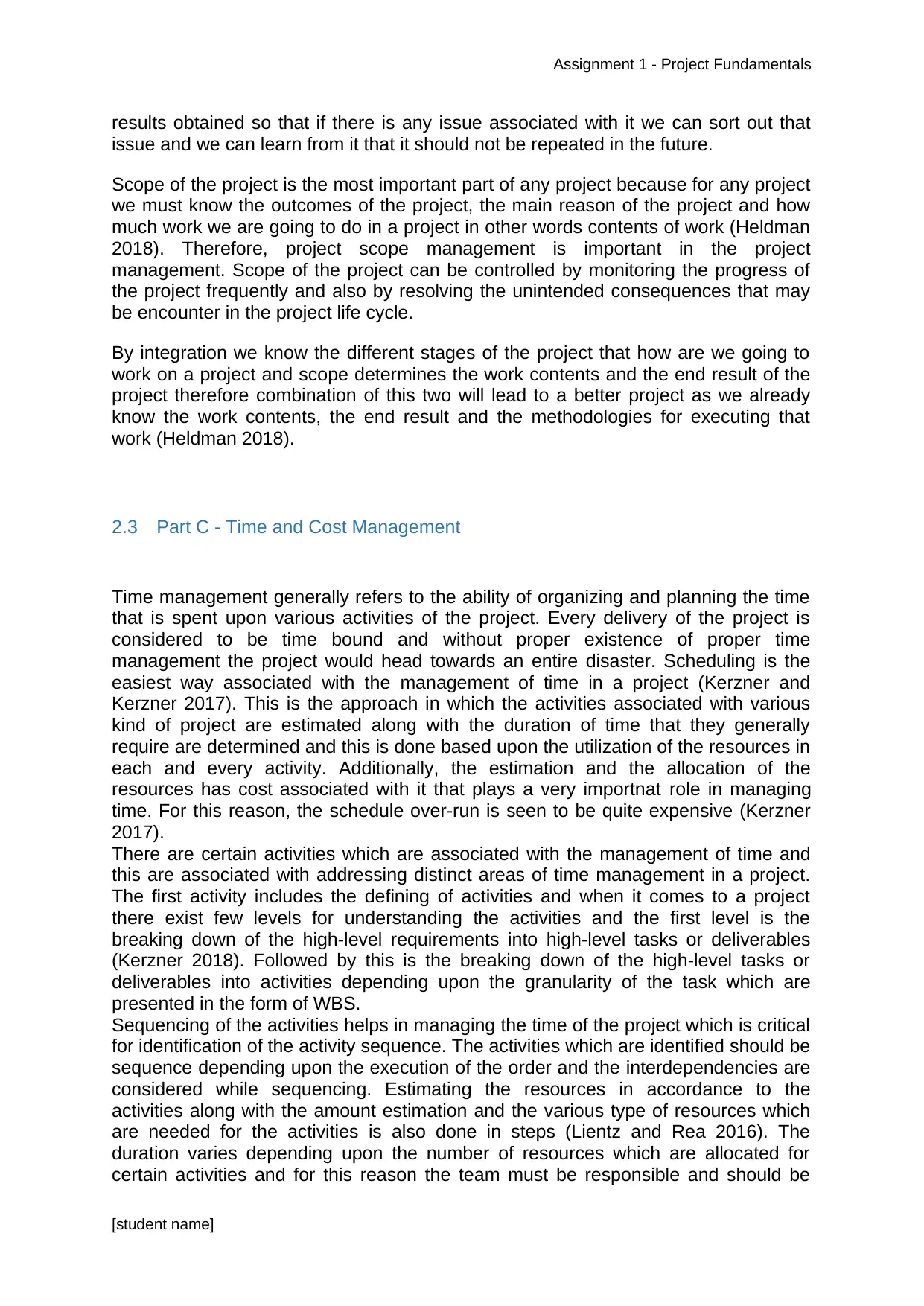
Assignment 1 - Project Fundamentals
results obtained so that if there is any issue associated with it we can sort out that
issue and we can learn from it that it should not be repeated in the future.
Scope of the project is the most important part of any project because for any project
we must know the outcomes of the project, the main reason of the project and how
much work we are going to do in a project in other words contents of work (Heldman
2018). Therefore, project scope management is important in the project
management. Scope of the project can be controlled by monitoring the progress of
the project frequently and also by resolving the unintended consequences that may
be encounter in the project life cycle.
By integration we know the different stages of the project that how are we going to
work on a project and scope determines the work contents and the end result of the
project therefore combination of this two will lead to a better project as we already
know the work contents, the end result and the methodologies for executing that
work (Heldman 2018).
2.3 Part C - Time and Cost Management
Time management generally refers to the ability of organizing and planning the time
that is spent upon various activities of the project. Every delivery of the project is
considered to be time bound and without proper existence of proper time
management the project would head towards an entire disaster. Scheduling is the
easiest way associated with the management of time in a project (Kerzner and
Kerzner 2017). This is the approach in which the activities associated with various
kind of project are estimated along with the duration of time that they generally
require are determined and this is done based upon the utilization of the resources in
each and every activity. Additionally, the estimation and the allocation of the
resources has cost associated with it that plays a very importnat role in managing
time. For this reason, the schedule over-run is seen to be quite expensive (Kerzner
2017).
There are certain activities which are associated with the management of time and
this are associated with addressing distinct areas of time management in a project.
The first activity includes the defining of activities and when it comes to a project
there exist few levels for understanding the activities and the first level is the
breaking down of the high-level requirements into high-level tasks or deliverables
(Kerzner 2018). Followed by this is the breaking down of the high-level tasks or
deliverables into activities depending upon the granularity of the task which are
presented in the form of WBS.
Sequencing of the activities helps in managing the time of the project which is critical
for identification of the activity sequence. The activities which are identified should be
sequence depending upon the execution of the order and the interdependencies are
considered while sequencing. Estimating the resources in accordance to the
activities along with the amount estimation and the various type of resources which
are needed for the activities is also done in steps (Lientz and Rea 2016). The
duration varies depending upon the number of resources which are allocated for
certain activities and for this reason the team must be responsible and should be
[student name]
results obtained so that if there is any issue associated with it we can sort out that
issue and we can learn from it that it should not be repeated in the future.
Scope of the project is the most important part of any project because for any project
we must know the outcomes of the project, the main reason of the project and how
much work we are going to do in a project in other words contents of work (Heldman
2018). Therefore, project scope management is important in the project
management. Scope of the project can be controlled by monitoring the progress of
the project frequently and also by resolving the unintended consequences that may
be encounter in the project life cycle.
By integration we know the different stages of the project that how are we going to
work on a project and scope determines the work contents and the end result of the
project therefore combination of this two will lead to a better project as we already
know the work contents, the end result and the methodologies for executing that
work (Heldman 2018).
2.3 Part C - Time and Cost Management
Time management generally refers to the ability of organizing and planning the time
that is spent upon various activities of the project. Every delivery of the project is
considered to be time bound and without proper existence of proper time
management the project would head towards an entire disaster. Scheduling is the
easiest way associated with the management of time in a project (Kerzner and
Kerzner 2017). This is the approach in which the activities associated with various
kind of project are estimated along with the duration of time that they generally
require are determined and this is done based upon the utilization of the resources in
each and every activity. Additionally, the estimation and the allocation of the
resources has cost associated with it that plays a very importnat role in managing
time. For this reason, the schedule over-run is seen to be quite expensive (Kerzner
2017).
There are certain activities which are associated with the management of time and
this are associated with addressing distinct areas of time management in a project.
The first activity includes the defining of activities and when it comes to a project
there exist few levels for understanding the activities and the first level is the
breaking down of the high-level requirements into high-level tasks or deliverables
(Kerzner 2018). Followed by this is the breaking down of the high-level tasks or
deliverables into activities depending upon the granularity of the task which are
presented in the form of WBS.
Sequencing of the activities helps in managing the time of the project which is critical
for identification of the activity sequence. The activities which are identified should be
sequence depending upon the execution of the order and the interdependencies are
considered while sequencing. Estimating the resources in accordance to the
activities along with the amount estimation and the various type of resources which
are needed for the activities is also done in steps (Lientz and Rea 2016). The
duration varies depending upon the number of resources which are allocated for
certain activities and for this reason the team must be responsible and should be
[student name]
Paraphrase This Document
Need a fresh take? Get an instant paraphrase of this document with our AI Paraphraser
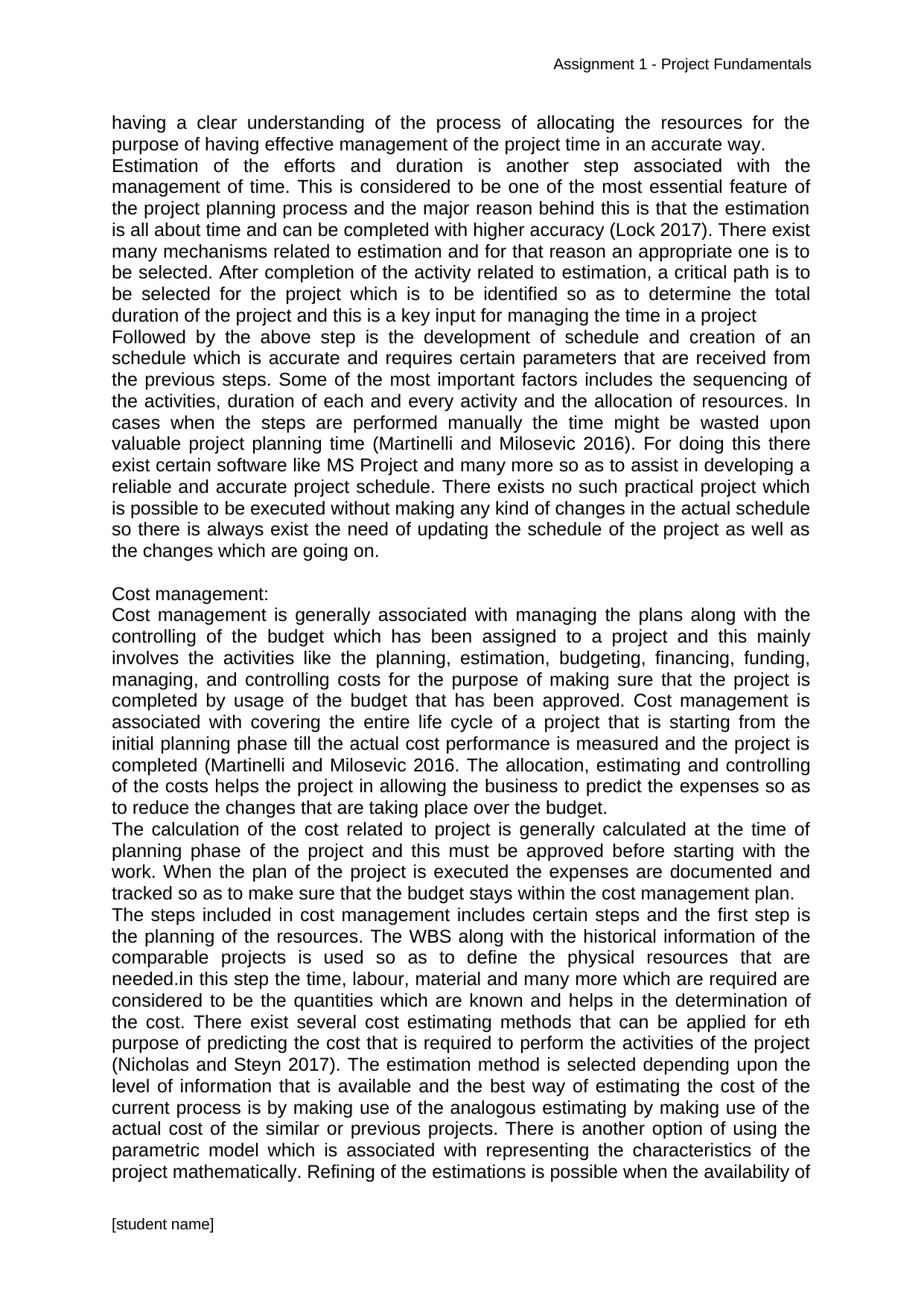
Assignment 1 - Project Fundamentals
having a clear understanding of the process of allocating the resources for the
purpose of having effective management of the project time in an accurate way.
Estimation of the efforts and duration is another step associated with the
management of time. This is considered to be one of the most essential feature of
the project planning process and the major reason behind this is that the estimation
is all about time and can be completed with higher accuracy (Lock 2017). There exist
many mechanisms related to estimation and for that reason an appropriate one is to
be selected. After completion of the activity related to estimation, a critical path is to
be selected for the project which is to be identified so as to determine the total
duration of the project and this is a key input for managing the time in a project
Followed by the above step is the development of schedule and creation of an
schedule which is accurate and requires certain parameters that are received from
the previous steps. Some of the most important factors includes the sequencing of
the activities, duration of each and every activity and the allocation of resources. In
cases when the steps are performed manually the time might be wasted upon
valuable project planning time (Martinelli and Milosevic 2016). For doing this there
exist certain software like MS Project and many more so as to assist in developing a
reliable and accurate project schedule. There exists no such practical project which
is possible to be executed without making any kind of changes in the actual schedule
so there is always exist the need of updating the schedule of the project as well as
the changes which are going on.
Cost management:
Cost management is generally associated with managing the plans along with the
controlling of the budget which has been assigned to a project and this mainly
involves the activities like the planning, estimation, budgeting, financing, funding,
managing, and controlling costs for the purpose of making sure that the project is
completed by usage of the budget that has been approved. Cost management is
associated with covering the entire life cycle of a project that is starting from the
initial planning phase till the actual cost performance is measured and the project is
completed (Martinelli and Milosevic 2016. The allocation, estimating and controlling
of the costs helps the project in allowing the business to predict the expenses so as
to reduce the changes that are taking place over the budget.
The calculation of the cost related to project is generally calculated at the time of
planning phase of the project and this must be approved before starting with the
work. When the plan of the project is executed the expenses are documented and
tracked so as to make sure that the budget stays within the cost management plan.
The steps included in cost management includes certain steps and the first step is
the planning of the resources. The WBS along with the historical information of the
comparable projects is used so as to define the physical resources that are
needed.in this step the time, labour, material and many more which are required are
considered to be the quantities which are known and helps in the determination of
the cost. There exist several cost estimating methods that can be applied for eth
purpose of predicting the cost that is required to perform the activities of the project
(Nicholas and Steyn 2017). The estimation method is selected depending upon the
level of information that is available and the best way of estimating the cost of the
current process is by making use of the analogous estimating by making use of the
actual cost of the similar or previous projects. There is another option of using the
parametric model which is associated with representing the characteristics of the
project mathematically. Refining of the estimations is possible when the availability of
[student name]
having a clear understanding of the process of allocating the resources for the
purpose of having effective management of the project time in an accurate way.
Estimation of the efforts and duration is another step associated with the
management of time. This is considered to be one of the most essential feature of
the project planning process and the major reason behind this is that the estimation
is all about time and can be completed with higher accuracy (Lock 2017). There exist
many mechanisms related to estimation and for that reason an appropriate one is to
be selected. After completion of the activity related to estimation, a critical path is to
be selected for the project which is to be identified so as to determine the total
duration of the project and this is a key input for managing the time in a project
Followed by the above step is the development of schedule and creation of an
schedule which is accurate and requires certain parameters that are received from
the previous steps. Some of the most important factors includes the sequencing of
the activities, duration of each and every activity and the allocation of resources. In
cases when the steps are performed manually the time might be wasted upon
valuable project planning time (Martinelli and Milosevic 2016). For doing this there
exist certain software like MS Project and many more so as to assist in developing a
reliable and accurate project schedule. There exists no such practical project which
is possible to be executed without making any kind of changes in the actual schedule
so there is always exist the need of updating the schedule of the project as well as
the changes which are going on.
Cost management:
Cost management is generally associated with managing the plans along with the
controlling of the budget which has been assigned to a project and this mainly
involves the activities like the planning, estimation, budgeting, financing, funding,
managing, and controlling costs for the purpose of making sure that the project is
completed by usage of the budget that has been approved. Cost management is
associated with covering the entire life cycle of a project that is starting from the
initial planning phase till the actual cost performance is measured and the project is
completed (Martinelli and Milosevic 2016. The allocation, estimating and controlling
of the costs helps the project in allowing the business to predict the expenses so as
to reduce the changes that are taking place over the budget.
The calculation of the cost related to project is generally calculated at the time of
planning phase of the project and this must be approved before starting with the
work. When the plan of the project is executed the expenses are documented and
tracked so as to make sure that the budget stays within the cost management plan.
The steps included in cost management includes certain steps and the first step is
the planning of the resources. The WBS along with the historical information of the
comparable projects is used so as to define the physical resources that are
needed.in this step the time, labour, material and many more which are required are
considered to be the quantities which are known and helps in the determination of
the cost. There exist several cost estimating methods that can be applied for eth
purpose of predicting the cost that is required to perform the activities of the project
(Nicholas and Steyn 2017). The estimation method is selected depending upon the
level of information that is available and the best way of estimating the cost of the
current process is by making use of the analogous estimating by making use of the
actual cost of the similar or previous projects. There is another option of using the
parametric model which is associated with representing the characteristics of the
project mathematically. Refining of the estimations is possible when the availability of
[student name]
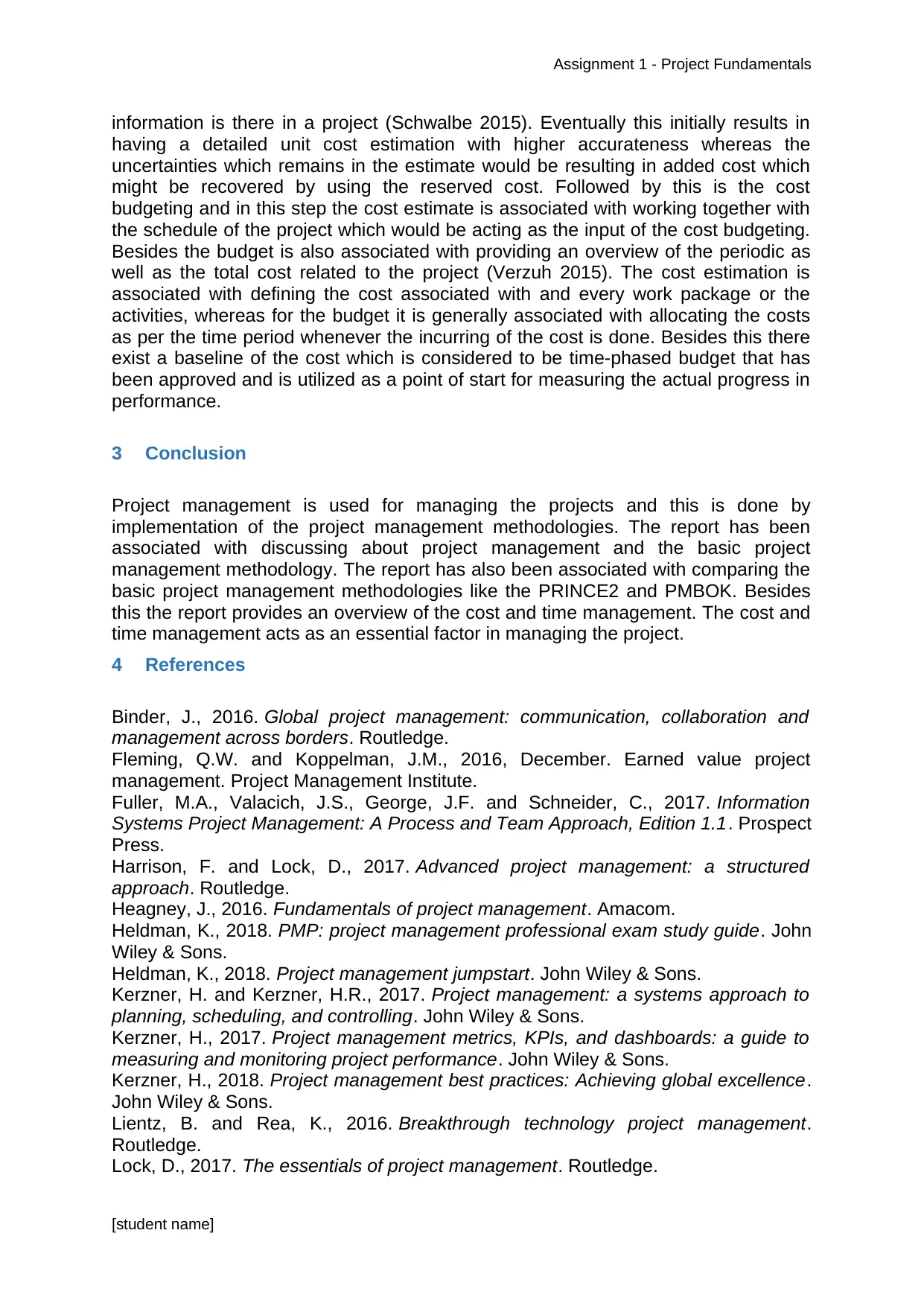
Assignment 1 - Project Fundamentals
information is there in a project (Schwalbe 2015). Eventually this initially results in
having a detailed unit cost estimation with higher accurateness whereas the
uncertainties which remains in the estimate would be resulting in added cost which
might be recovered by using the reserved cost. Followed by this is the cost
budgeting and in this step the cost estimate is associated with working together with
the schedule of the project which would be acting as the input of the cost budgeting.
Besides the budget is also associated with providing an overview of the periodic as
well as the total cost related to the project (Verzuh 2015). The cost estimation is
associated with defining the cost associated with and every work package or the
activities, whereas for the budget it is generally associated with allocating the costs
as per the time period whenever the incurring of the cost is done. Besides this there
exist a baseline of the cost which is considered to be time-phased budget that has
been approved and is utilized as a point of start for measuring the actual progress in
performance.
3 Conclusion
Project management is used for managing the projects and this is done by
implementation of the project management methodologies. The report has been
associated with discussing about project management and the basic project
management methodology. The report has also been associated with comparing the
basic project management methodologies like the PRINCE2 and PMBOK. Besides
this the report provides an overview of the cost and time management. The cost and
time management acts as an essential factor in managing the project.
4 References
Binder, J., 2016. Global project management: communication, collaboration and
management across borders. Routledge.
Fleming, Q.W. and Koppelman, J.M., 2016, December. Earned value project
management. Project Management Institute.
Fuller, M.A., Valacich, J.S., George, J.F. and Schneider, C., 2017. Information
Systems Project Management: A Process and Team Approach, Edition 1.1. Prospect
Press.
Harrison, F. and Lock, D., 2017. Advanced project management: a structured
approach. Routledge.
Heagney, J., 2016. Fundamentals of project management. Amacom.
Heldman, K., 2018. PMP: project management professional exam study guide. John
Wiley & Sons.
Heldman, K., 2018. Project management jumpstart. John Wiley & Sons.
Kerzner, H. and Kerzner, H.R., 2017. Project management: a systems approach to
planning, scheduling, and controlling. John Wiley & Sons.
Kerzner, H., 2017. Project management metrics, KPIs, and dashboards: a guide to
measuring and monitoring project performance. John Wiley & Sons.
Kerzner, H., 2018. Project management best practices: Achieving global excellence.
John Wiley & Sons.
Lientz, B. and Rea, K., 2016. Breakthrough technology project management.
Routledge.
Lock, D., 2017. The essentials of project management. Routledge.
[student name]
information is there in a project (Schwalbe 2015). Eventually this initially results in
having a detailed unit cost estimation with higher accurateness whereas the
uncertainties which remains in the estimate would be resulting in added cost which
might be recovered by using the reserved cost. Followed by this is the cost
budgeting and in this step the cost estimate is associated with working together with
the schedule of the project which would be acting as the input of the cost budgeting.
Besides the budget is also associated with providing an overview of the periodic as
well as the total cost related to the project (Verzuh 2015). The cost estimation is
associated with defining the cost associated with and every work package or the
activities, whereas for the budget it is generally associated with allocating the costs
as per the time period whenever the incurring of the cost is done. Besides this there
exist a baseline of the cost which is considered to be time-phased budget that has
been approved and is utilized as a point of start for measuring the actual progress in
performance.
3 Conclusion
Project management is used for managing the projects and this is done by
implementation of the project management methodologies. The report has been
associated with discussing about project management and the basic project
management methodology. The report has also been associated with comparing the
basic project management methodologies like the PRINCE2 and PMBOK. Besides
this the report provides an overview of the cost and time management. The cost and
time management acts as an essential factor in managing the project.
4 References
Binder, J., 2016. Global project management: communication, collaboration and
management across borders. Routledge.
Fleming, Q.W. and Koppelman, J.M., 2016, December. Earned value project
management. Project Management Institute.
Fuller, M.A., Valacich, J.S., George, J.F. and Schneider, C., 2017. Information
Systems Project Management: A Process and Team Approach, Edition 1.1. Prospect
Press.
Harrison, F. and Lock, D., 2017. Advanced project management: a structured
approach. Routledge.
Heagney, J., 2016. Fundamentals of project management. Amacom.
Heldman, K., 2018. PMP: project management professional exam study guide. John
Wiley & Sons.
Heldman, K., 2018. Project management jumpstart. John Wiley & Sons.
Kerzner, H. and Kerzner, H.R., 2017. Project management: a systems approach to
planning, scheduling, and controlling. John Wiley & Sons.
Kerzner, H., 2017. Project management metrics, KPIs, and dashboards: a guide to
measuring and monitoring project performance. John Wiley & Sons.
Kerzner, H., 2018. Project management best practices: Achieving global excellence.
John Wiley & Sons.
Lientz, B. and Rea, K., 2016. Breakthrough technology project management.
Routledge.
Lock, D., 2017. The essentials of project management. Routledge.
[student name]
⊘ This is a preview!⊘
Do you want full access?
Subscribe today to unlock all pages.

Trusted by 1+ million students worldwide
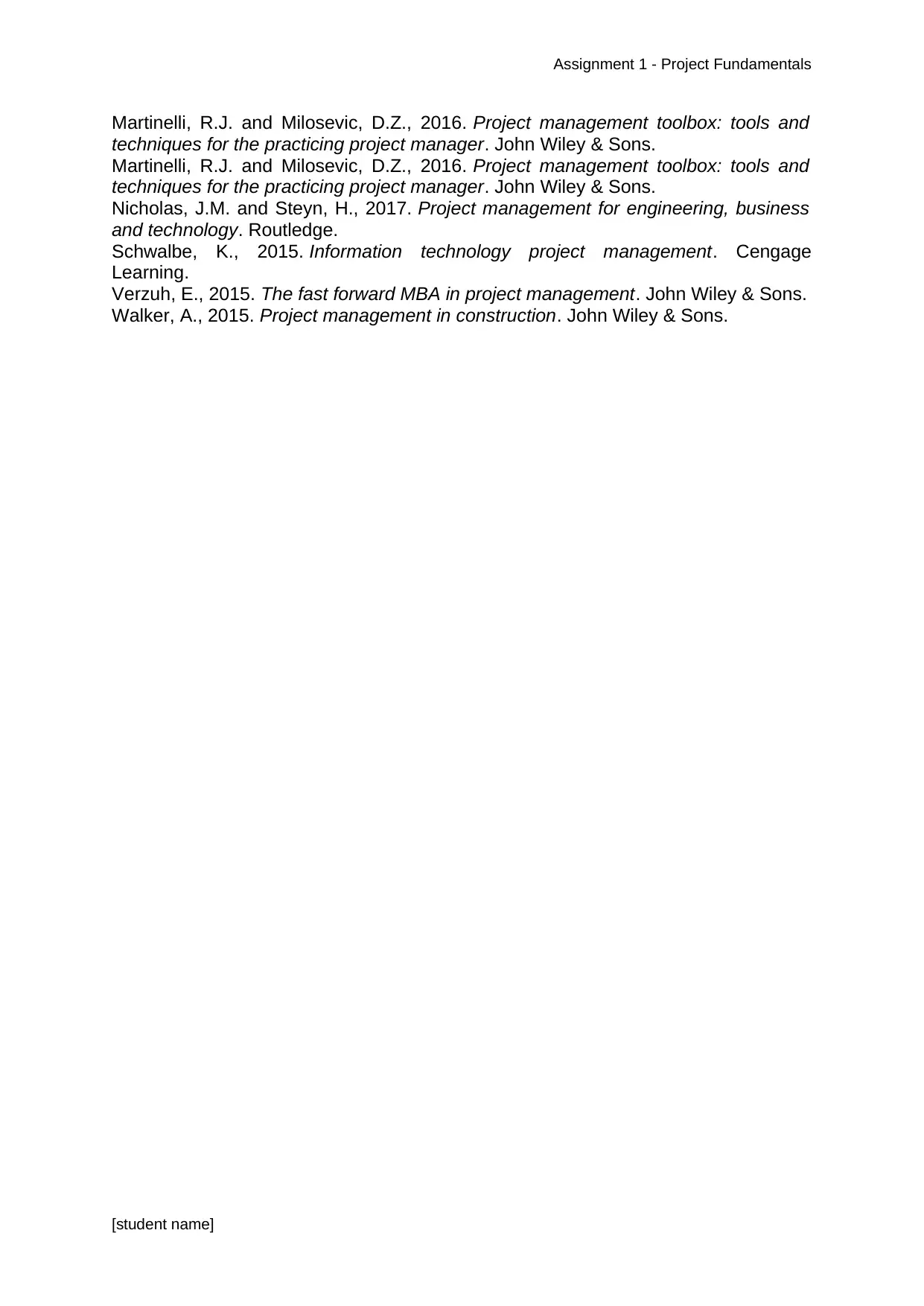
Assignment 1 - Project Fundamentals
Martinelli, R.J. and Milosevic, D.Z., 2016. Project management toolbox: tools and
techniques for the practicing project manager. John Wiley & Sons.
Martinelli, R.J. and Milosevic, D.Z., 2016. Project management toolbox: tools and
techniques for the practicing project manager. John Wiley & Sons.
Nicholas, J.M. and Steyn, H., 2017. Project management for engineering, business
and technology. Routledge.
Schwalbe, K., 2015. Information technology project management. Cengage
Learning.
Verzuh, E., 2015. The fast forward MBA in project management. John Wiley & Sons.
Walker, A., 2015. Project management in construction. John Wiley & Sons.
[student name]
Martinelli, R.J. and Milosevic, D.Z., 2016. Project management toolbox: tools and
techniques for the practicing project manager. John Wiley & Sons.
Martinelli, R.J. and Milosevic, D.Z., 2016. Project management toolbox: tools and
techniques for the practicing project manager. John Wiley & Sons.
Nicholas, J.M. and Steyn, H., 2017. Project management for engineering, business
and technology. Routledge.
Schwalbe, K., 2015. Information technology project management. Cengage
Learning.
Verzuh, E., 2015. The fast forward MBA in project management. John Wiley & Sons.
Walker, A., 2015. Project management in construction. John Wiley & Sons.
[student name]
1 out of 7
Related Documents
Your All-in-One AI-Powered Toolkit for Academic Success.
+13062052269
info@desklib.com
Available 24*7 on WhatsApp / Email
![[object Object]](/_next/static/media/star-bottom.7253800d.svg)
Unlock your academic potential
Copyright © 2020–2026 A2Z Services. All Rights Reserved. Developed and managed by ZUCOL.





